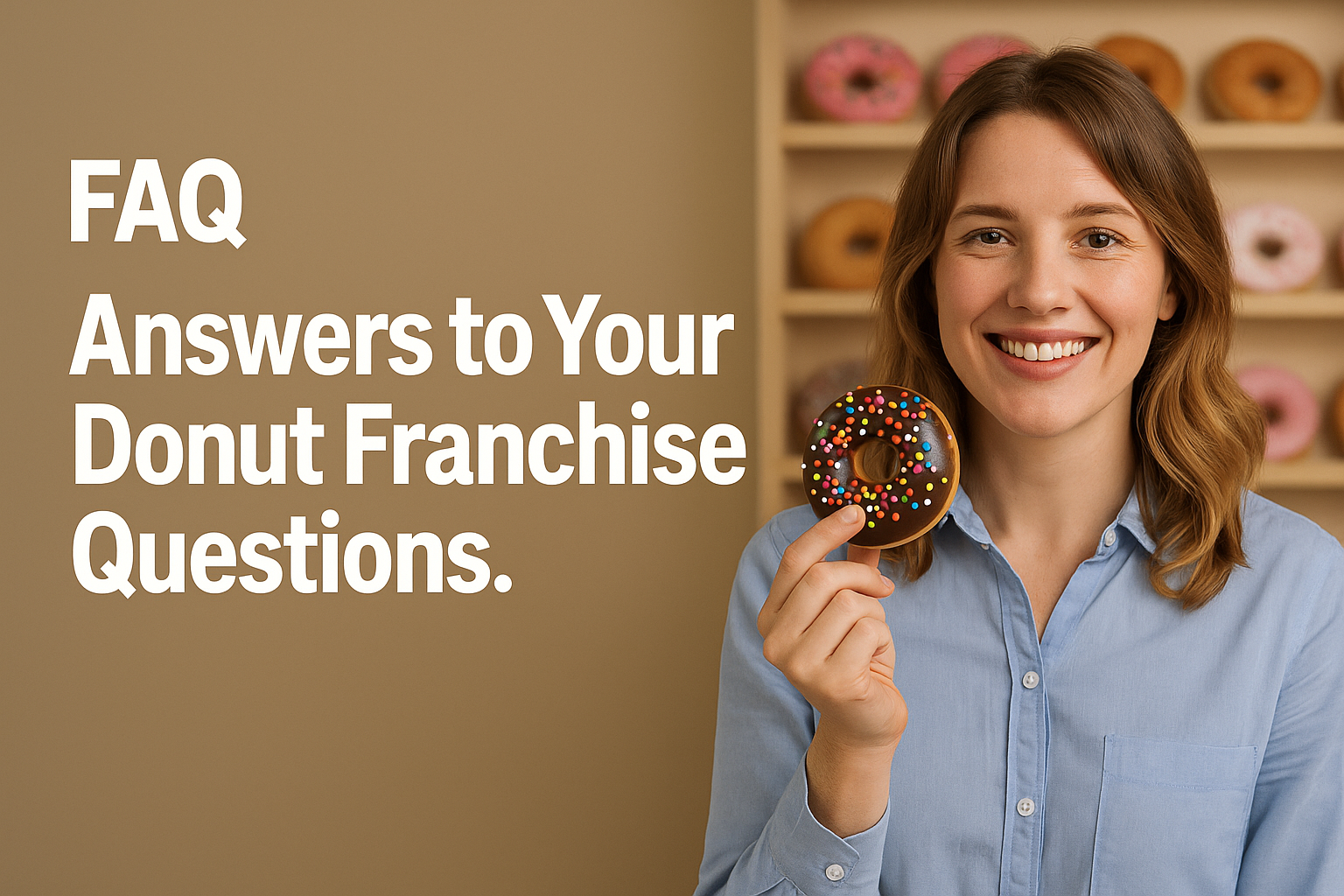
DonutFranchiseMaster.com
Your Donut Franchise Questions Answered
Get fast, straightforward answers about costs, revenue, training, and locations—so you can pick the best donut franchise with confidence.
Compare Top Donut Brands →
FAQ
Quick note: these are general ranges for popular donut brands. For specific details, use our comparison tool or request FDD info.
1. How much does it cost to open a donut franchise?⌄
Estimated startup costs:
- Small walk-up or kiosk models: $60,000–$200,000
- Standard shopfront locations: $200,000–$600,000+
- Prime or high-traffic sites: $600,000–$1.2M+
2. What is a franchise fee?⌄
A one-time investment to join the brand—including use of name, systems, recipes, and support—commonly ranges from $15,000–$60,000 in this category.
3. Do I need prior food service experience?⌄
Not required. Franchise systems we list offer complete onboarding—from donut prep and shop ops to staffing and marketing—to help you succeed.
4. What training & support do I receive?⌄
Training typically covers shop operations, recipe consistency, hiring, local promotions, POS/delivery systems, plus ongoing operational and seasonal support.
5. How profitable is a donut franchise?⌄
Typical performance metrics:
- Profit margins: 12%–22%
- Annual revenue potential: $250,000–$1.2M+
- Break-even period: 1–3 years with effective management
6. Can I select my own location?⌄
Yes—subject to franchisor approval. Many brands assist with site selection, factoring in foot traffic, visibility, competition, and access.
7. What recurring costs are involved?⌄
Ongoing expenses typically include:
- Royalties: ~4%–7% of gross sales
- Marketing contributions: ~1%–3% of sales
- Inventory, labor, rent, utilities, insurance, maintenance
8. What leads to success in a donut franchise?⌄
Success hinges on strong brand identity, loyal customer base, diverse menu, consistent quality, efficient shop operations, and active promotion.
9. Why choose DonutFranchiseMaster.com?⌄
We offer curated donut brands, side-by-side comparisons, industry expertise, and direct access to franchisors seeking expansion partners.
10. What menu mix works best (donuts vs. coffee vs. snacks)?⌄
Pair core donuts with high-margin beverages (coffee, cold brew), breakfast sandwiches, and seasonal LTOs. Beverage attach-rate is a major profit driver.
11. On-site production or commissary—what’s better?⌄
On-site: fresher perception, aroma marketing, higher labor/equipment needs.
Commissary: consistency and speed, lower in-store labor, delivery logistics required. Many brands use a hybrid (proof & finish on-site).
Commissary: consistency and speed, lower in-store labor, delivery logistics required. Many brands use a hybrid (proof & finish on-site).
12. What equipment is essential?⌄
Mixers, proofers, fryers or ovens (for cake/yeast styles), glazing tables, display cases, refrigeration/freezers, POS, and for beverage programs: espresso/coffee brewers and grinders.
13. How many staff do I need and what hours work best?⌄
Typical shop: 6–12 staff across shifts. Peak demand is mornings and weekends; many shops open early (5–6am) and close mid-afternoon to reduce labor and waste.
14. Do brands support delivery and online ordering?⌄
Yes—integrations with major delivery platforms and first-party ordering are common. Consider box bundles and office/catering packs to lift tickets and route density.
15. How do I minimize waste and manage shelf life?⌄
Forecast demand by daypart, use bake-to-par systems, discount late-day inventory, and repurpose into minis/assortments. Tight inventory and batch control protect margins.
16. What about dietary options (gluten-free, vegan)?⌄
Many brands pilot limited GF/vegan SKUs or designated prep to avoid cross-contact. Start with a few proven recipes; scale based on local demand and operational feasibility.
17. What KPIs should I track?⌄
Average ticket, items per order, beverage attach rate, food cost %, labor %, waste %, morning/hourly sales mix, loyalty participation, and delivery channel contribution margin.
18. Do you assist with financing or incentives?⌄
We can guide SBA/equipment financing options and introduce lenders familiar with donut concepts. Some brands offer fee discounts for multi-unit or targeted markets—ask during discovery day.
19. Can I convert my current bakery/café into a donut franchise?⌄
Often yes—if your layout/venting, parking, and demographics meet standards. Conversions can cut capex and time-to-open versus ground-up builds.
20. How long does it take to open?⌄
Kiosk/inline: ~3–6 months. Build-out or conversions: ~4–9 months, depending on lease, permits, equipment lead times, hiring, and training windows.
21. Do brands offer multi-unit or area development?⌄
Yes—many donut brands provide staged development schedules, reduced fees on additional units, and territory protections based on population or drive times.
22. What marketing works best for donut shops?⌄
Grand-opening samplings, office drops, school/charity tie-ins, seasonal flavors, UGC on social, SMS/loyalty offers before morning peaks, and partnership bundles with coffee are proven winners.
Franchisee Insights and Success Stories

Discover real stories from our franchise partners, sharing their journeys and the support they’ve received at Donut Franchise Master.